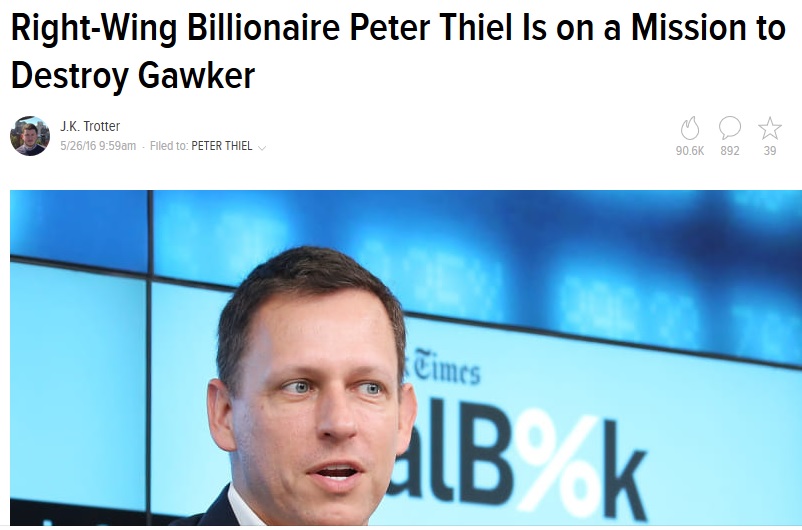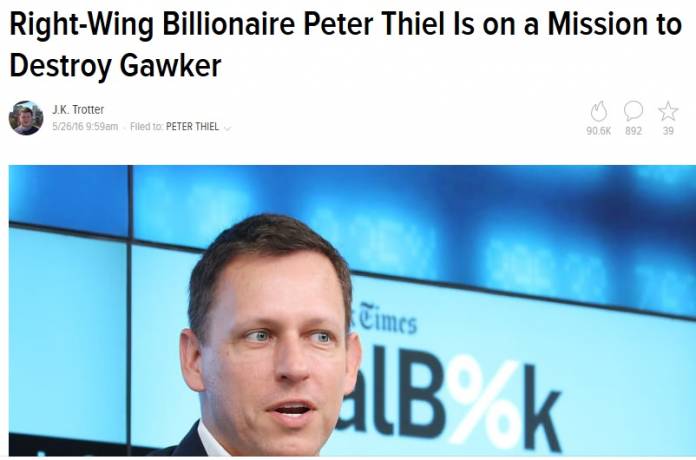Gawker.com, which helped redefine journalism in the era of the blogger, shut down Monday, and while much of the discussion has been around the site’s gossip, sometimes irresponsible postings, and a Hulk Hogan sex tape, I have a different take:
This is scary as shit.

By all accounts, Gawker is dead not because of a failed business model or because advertisers abandoned it or readers got tired of the content and went elsewhere. It’s out of business because one billionaire who had a vendetta against the site financed legal action that ran up legal costs to the point where it couldn’t possibly continue. Peter Thiel, according to the New York Times, had a secret plan to find people who wanted to sue Gawker and hired lawyers to fund their cases.
I was never a huge Gawker fan; not my style. I have always looked for journalism that is more thoughtful and less snarky; I am not into celebrity gossip in the first place. But Gawker was a news outlet that did real reporting (even if it was about the mayor of Toronto’s alleged crack habit) and made appropriate mockery of the Silicon Valley royalty. It was journalism, independent journalism.
I, personally, would never have run a post saying that Peter Theil was gay; I’ve always been a bit troubled by the idea of outing someone, since really it’s nobody’s business. And Gawker has done that sort of thing more than once.
I would never have posted a sex tape of Hulk Hogan, either; that’s really not part of our beat here at 48hills, and I could argue that it’s nobody’s business who a retired pro wrestler is fucking anyway.
But those are the kinds of decisions that news outlets make all the time, and there’s good and bad judgement about what the public ought to know – and all of us, all of us, get it wrong sometimes. That’s not the point.
It was probably 25 years ago that we started hearing about the “chilling effect” of libel suits. Some powerful individuals and interest groups had figured out that they could stop some types of news coverage – especially coverage by smaller outlets – by threatening to sue and marshaling the kinds of legal resources that small publishers could never fight.
Even if you’re completely in the legal right, a libel suit is way expensive. Even if you have insurance, there are deductibles and limits. If you’re a small operator, the time involved in defending yourself is massive.
The threats worked; some stories never got reported. Some outlets, even bigger ones, backed away from hard-hitting investigative reporting – which is expensive enough as it is, without the added costs of defending lawsuits.
Some states have passed anti-SLAPP statutes; a SLAPP suit is a Strategic Lawsuit Against Public Participation, aimed at chilling an activist group or a news outlet. Those laws make it easier to dismiss what is clearly a frivolous case – and force the folks filing the suit to pay the defendant’s legal fees.
But the threat is still there. Every investigative reporter knows about it. Every editor loses sleep over it.
And now we have the chilling effect, on steroids. One guy, Thiel, a libertarian-leaning supporter of Donald Trump, decided he hated Gawker and wanted to shut them down. He set in motion a plan to file legal actions, and wound up secretly funding Hogan’s lawsuit, which led to a $140 million verdict and the end of Gawker.
The idea that there are rich people out there who decide that they are going to destroy a news outlet – and then use libel suits to get away with it – is terrifying to all of us who have had occasion to piss off the very rich.
It should be terrifying to anyone who worries about a free press in this country.
I’m not defending Gawker’s decision to publish the Hulk Hogan sex tape (although I think the size of the verdict was far more punitive that it should have been). Gawker, of all outlets, needed to understand better how in the Internet era, when news and gossip (even if it’s untrue) whips around the world a light speed and can quickly damage people’s lives, it’s important for reporters and editors to have some sense of human decency. If Hogan had gone on his own and looked for a lawyer and sued, that would be one thing. (And the case would more likely have settled; without deep-pockets funding, most lawyers would have taken a nice payday that Gawker could have afforded and gone home).
But to have a billionaire who had nothing to do with Hogan, the tape, Bubba the Love Sponge, his wife, or any of this taking aim at a news site and killing it … we should all be afraid.
Who’s next?








